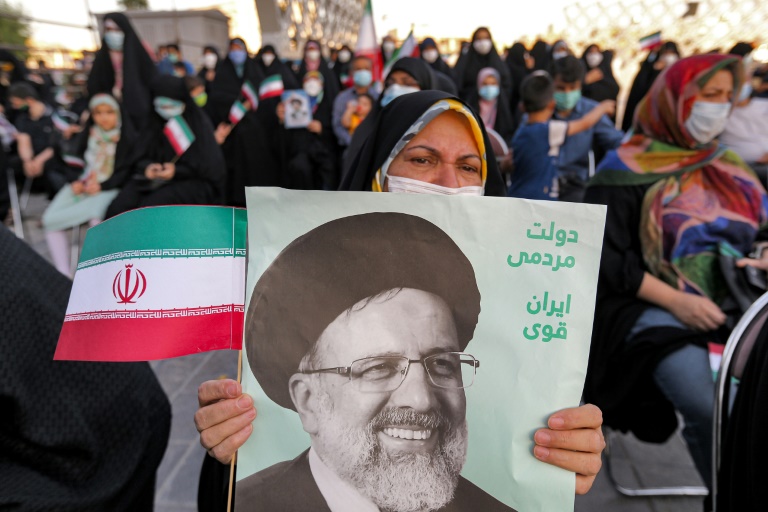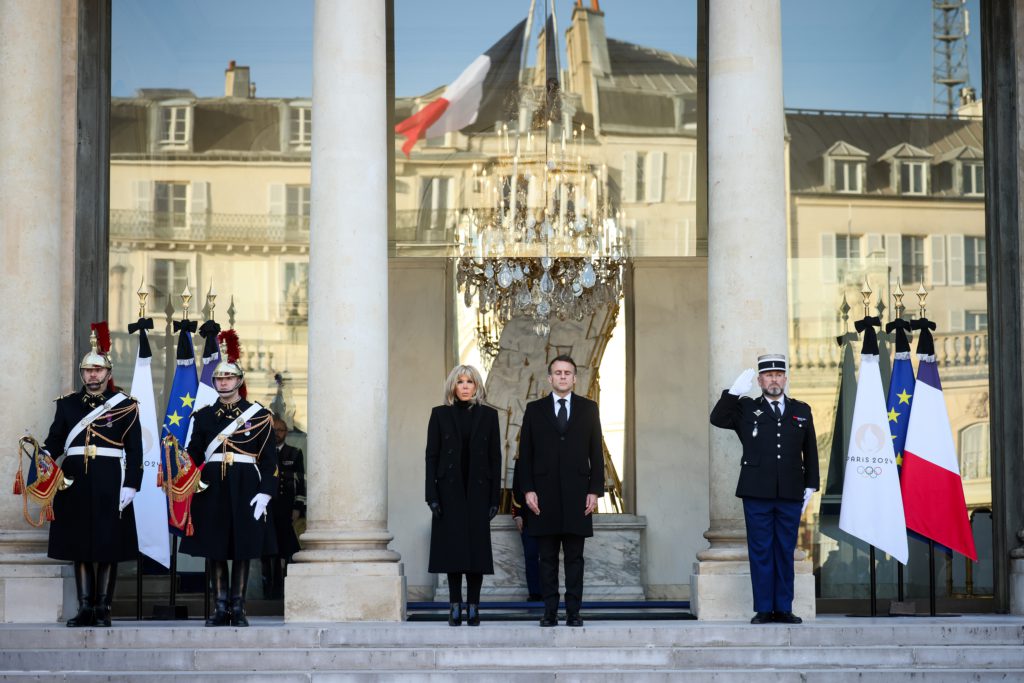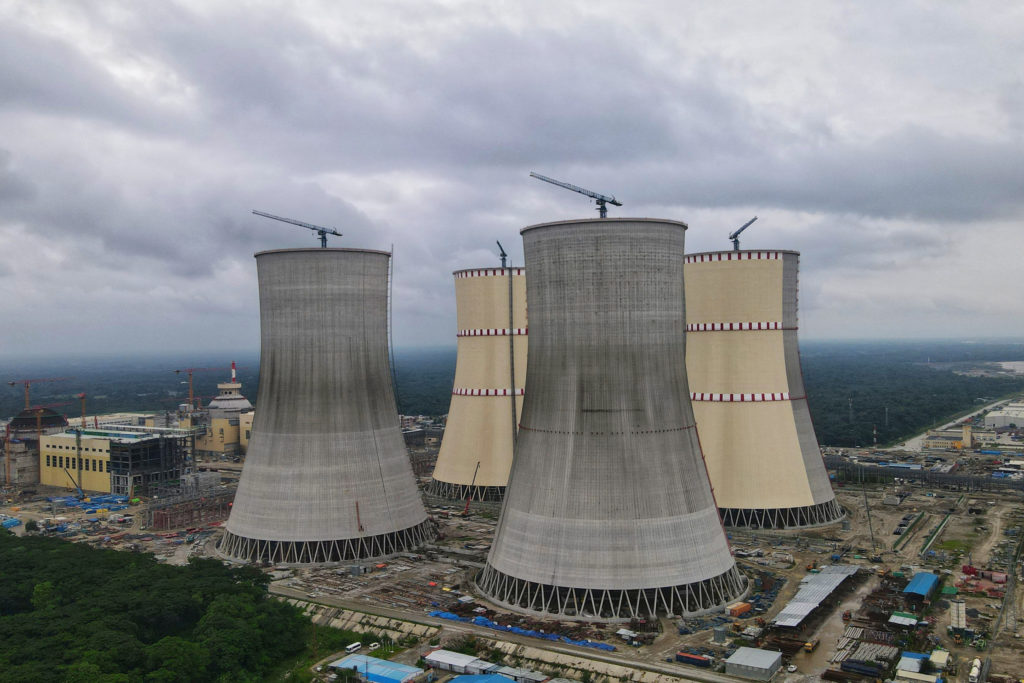Ultraconservative cleric Ebrahim Raisi was declared the winner of Iran’s presidential election Saturday, a widely anticipated result after many political heavyweights were barred from running.
Raisi won just shy of 62 percent of the vote in Friday’s election, according to official figures, on a turnout of 48.8 percent, a record low for a presidential poll in the Islamic republic.
“I congratulate the people on their choice,” said outgoing moderate President Hassan Rouhani, who has served the maximum of two consecutive four-year terms and leaves office in August.
Raisi, 60, is set to take over at a critical time, as Iran seeks to salvage its tattered nuclear deal with major powers and free itself from punishing US sanctions that have driven a deep economic crisis.
“God willing, we will do our best so that the hope for the future now alive in people’s hearts grows further,” said Raisi, vowing to strengthen public trust in the government for a “bright and pleasant life together”.
The head of the Iranian judiciary, whose black turban signifies direct descent from Islam’s Prophet Mohammed, Raisi is seen as close to the 81-year-old supreme leader, Ayatollah Ali Khamenei, who holds ultimate political power in Iran.
Friday’s voting was extended by two hours past the original midnight deadline amid fears of a low turnout.
Many voters chose to stay away after the field of some 600 hopefuls including 40 women had been winnowed down to seven candidates, all men, excluding an ex-president and a former parliament speaker.
Three of the vetted candidates dropped out two days before Friday’s vote.
– ‘Save the people’ –
On election day, pictures of often flag-waving voters dominated state TV coverage, but away from the polling stations some voiced anger at what they saw as a stage-managed election.
“Whether I vote or not, someone has already been elected,” said Tehran shopkeeper Saeed Zareie. “They organise the elections for the media.”
Enthusiasm was dampened further by spiralling inflation and job losses, and the Covid-19 pandemic that has killed more than 80,000 Iranians by the official count.
Among those who queued to vote at schools, mosques and community centres, many hailed Raisi, who has promised to fight corruption, help the poor and build millions of flats for low-income families.
A nurse named Sahebiyan said she backed him for his anti-graft credentials and in the hope he would “move the country forward” to “save the people from economic, cultural and social deprivation”.
In the polls, Raisi beat ultraconservative Mohsen Rezai, a former commander of the Islamic Revolutionary Guard Corps, who came second with 11.8 percent of the vote, followed by former central bank chief Abdolnasser Hemmati on 8.4 percent.
Another ultraconservative, Amirhossein Ghazizadeh-Hashemi, came last with 3.5 percent.
Khamenei hailed the election, saying that “the great winner… is the Iranian nation because it has risen up once again in the face of the propaganda of the enemy’s mercenary media”.
Raisi succeeds the moderate Rouhani, whose landmark achievement was the 2015 deal with world powers under which Iran agreed to limit its nuclear programme in return for sanctions relief.
But he inherits a country in the grip of a serious economic crisis due to US sanctions imposed after then president Donald Trump withdrew Washington from the accord in 2018 and launched a “maximum pressure” campaign against Iran.
Iran’s ultraconservative camp — which deeply distrusts the United States, labelled the “Great Satan” in the Islamic republic — attacked Rouhani over the failing deal.
Despite this, Iran’s senior political figures, including Raisi, have voiced broad agreement that the country must seek an end to the US sanctions.
– Nuclear talks –
The United States regretted that “Iranians were denied their right to choose their own leaders in a free and fair electoral process,” a State Department spokesman said, but added Washington would nonetheless continue indirect talks with Iran on rejoining the nuclear accord that Trump abandoned.
Analysts for think-thank the Eurasia Group said Raisi’s election win would likely not derail ongoing talks in Vienna to salvage the nuclear deal.
But they warned that “his hardline, anti-Western views are a sharp break from the more moderate stances of Rouhani and will have a significant impact on Tehran’s relationship with the outside world”.
Abroad, Raisi was congratulated by Russian President Vladimir Putin and Syria’s Bashar al-Assad, along with the UAE’s leader Sheikh Mohamed bin Zayed Al-Nahyan and the Palestinian Islamist movement Hamas, which is supported by Tehran.
Israel however said his election “should prompt grave concern among the international community,” with foreign ministry spokesman Lior Haiat accusing the ultraconservative of being “committed to Iran’s rapidly advancing military nuclear program”.
Tehran has always denied seeking a nuclear weapon.
Ultimate power in Iran, since its 1979 revolution toppled the US-backed monarchy, rests with the supreme leader, but the president wields major influence in areas from industrial policy to foreign affairs.
Raisi, who holds deeply conservative views on many social issues including the role of women in public life, has been named in Iranian media as a possible successor to Khamenei.
To opposition and human rights groups, his name is linked to mass executions of political prisoners in 1988. The US government has imposed sanctions on him over the killings, in which Raisi has denied involvement.
Asked in 2018 and again last year about the executions, Raisi denied playing a role, even as he lauded an order he said was handed down by the Islamic republic’s founder Ayatollah Ruhollah Khomeini to proceed with the purge.
ap-ah-mj-fz/mtp/reb










